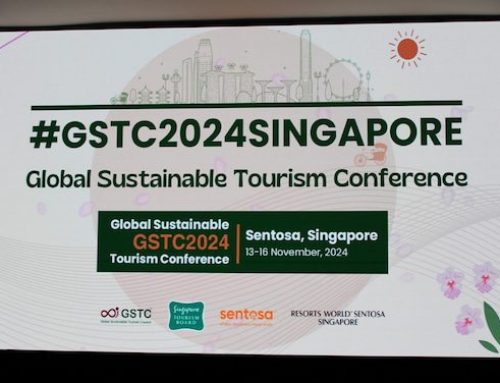
“Barceló ReGen” is the name of Barcelo’s new sustainability plan, which aimes to drive forward a profound cultural transformation in every area of the company’s activity, consolidating their social, economic, and environmental commitment.
The Barceló ReGen strategy was created to promote a positive impact from Barceló and help them achieve their ambition of becoming leaders in regenerative tourism. It is based on three pillars:
- Glocal. Sustainable investment in local communities with global impact.
- Fair, Ethical (Social role).
- Caring for the Planet – Caring for People.
The GSTC-Recognized status refers to the standard itself, indicating that a sustainable tourism standard has been reviewed by GSTC technical experts and the GSTC Assurance Panel and deemed the content of the standard equivalent to the GSTC Criteria for sustainable tourism. It shows that the set of standards is based on the four pillars of the GSTC Criteria: Sustainable Management, Socioeconomic, Cultural, and Environmental principles.
GSTC Recognition of Standards does not relate to the process of certification (which is a third-party assessment, through an audit, of a tourism enterprise for conformity to a standard). GSTC Recognition of Standards does not relate to accreditation (formal verification that a certification body operates in a competent and neutral manner according to international standards of how to properly certify, which is the highest level of assurance).
The stated scope of the standard is ‘Hotels’ and coverage is global. The GSTC Recognition is valid until either the standard or the GSTC Industry Criteria are changed.
“The recognition of our standards by the GSTC is the best acknowledgment to the work done by Barceló Hotel Group and a boost to advance in the consolidation of our own sustainability processes. An ambitious project of cultural transformation of the company with the aim of reinforcing our commitment to generate a positive impact in the destinations where we are present and contribute to a fairer development of the local economy, committed to the care of the environment and people,” said Raúl González, CEO EMEA of Barceló Hotel Group.
“Applying the Four Pillars of the GSTC Criteria means Barceló is taking a holistic approach to sustainability, going beyond environmental issues to include community impacts, many social and cultural issues, and getting the management and governance structures in place to pursue continuous improvement,” says Randy Durband, GSTC CEO.
Currently, 15 destination standards, 20 tour operator standards, 44 hotel standards, and 5 systems have achieved GSTC-Recognized status. The status offers the market proof that these standards adhere to international norms. GSTC Recognition does not ensure that a certification process is reliable, only that the set of standards used to certify are equivalent to the GSTC Criteria. GSTC-Recognized standard owners are encouraged to follow and complete the accreditation process, which assures that the certification process used to apply the standard meets international best practices, transparency, and rigor. A list of GSTC-Accredited certification bodies is available here.
About the GSTC
The Global Sustainable Tourism Council® (GSTC®) establishes and manages global sustainable standards, known as the GSTC Criteria. There are two sets: Destination Criteria for public policy-makers and destination managers, and Industry Criteria for hotels and tour operators. These are the guiding principles and minimum requirements that any tourism business or destination should aspire to reach in order to protect and sustain the world’s natural and cultural resources, while ensuring tourism meets its potential as a tool for conservation and poverty alleviation.
The GSTC Criteria form the foundation for Accreditation of Certification Bodies that certify hotels/accommodations, tour operators, and destinations as having sustainable policies and practices in place. GSTC does not directly certify any products or services; but it accredits those that do. The GSTC is an independent and neutral USA-registered 501(c)3 non-profit organization that represents a diverse and global membership, including national and provincial governments, leading travel companies, hotels, tour operators, NGO’s, individuals and communities – all striving to achieve best practices in sustainable tourism.
Information for media and the press: https://staging.gstcouncil.org/about/for-the-press/
About Barceló Group
The Barceló Group, with more than 90 years of experience in the national and international tourism sector, was founded in 1931 by Simón Barceló in the island of Mallorca (Spain); It is a vertically integrated tourism group that is made up of the Barceló Hotel Group, which has more than 290 hotels and more than 64,000 rooms in 30 countries; and by the travel division Ávoris, which has more than 1,600 travel agencies on 4 continents, several tour operators and receptive operators, and even an airline.
Barceló Hotel Group is constituted by 4 insignias: Royal Hideaway Luxury Hotels & Resorts, Barceló Hotels & Resorts, Occidental Hotels & Resorts and Allegro Hotels.
Barceló Hotel Group is the 2nd largest chain in Spain and one of the 30 largest in the world in number of rooms. It currently has 208 four- and five-star city and holiday hotels, and more than 62,000 rooms distributed over 25 countries and marketed under four brands.
More information: www.barcelo.com and www.barcelogrupo.com




